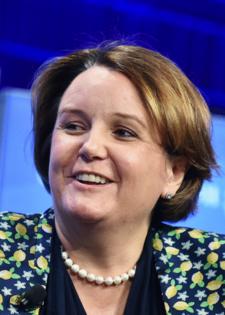Antitrust leaders push to shield high-profile cases from DOJ cuts
Published in Business News
Top officials in the Justice Department’s antitrust division are trying to blunt an agency-wide reorganization plan from derailing major competition cases, according to people familiar with the matter.
Gail Slater, who took over the unit last month after being nominated by President Donald Trump, is seeking to shield key aspects of the division’s work from the cutbacks, which would include closing two field offices, said one of the people, who asked not to be identified discussing confidential matters.
The internal wrangling follows a March 25 memo by Deputy Attorney General Todd Blanche that called for a broad reorganization of the department. Officials are up against a Wednesday deadline to formally weigh in on the blueprint, which would close the San Francisco and Chicago field offices and fold the department’s antitrust policy team and economics and tech experts into a centralized policy office.
In a recent email to staff seen by Bloomberg News, Slater sought to allay some of the concerns. She promised to “advocate for the antitrust division’s resources and interests,” in a March 27 message that didn’t directly address the specific plans laid out by Blanche.
San Francisco
The San Francisco office chief, Leslie Wulff, held a meeting for all antitrust staff on the proposal after it was announced and relayed that senior division leaders hoped to forestall efforts to close the office, said one of the people.
The Justice Department declined to comment.
The antitrust division has so far been largely exempt from the Trump administration’s more drastic efforts to downsize the federal government. Antitrust leaders intervened and stopped an earlier effort to reassign Manish Kumar, the division’s top criminal prosecutor, to a task force focused on immigration enforcement, Bloomberg reported.
The cuts would leave only the division’s offices in Washington and New York to police anticompetitive behavior across the country. The proposals could lead to the departures of dozens of lawyers, potentially affecting the division’s ability to advance landmark cases against technology giants, as well as a high-profile investigation into egg prices, said the people.
Tech cases
The San Francisco office spearheaded the division’s monopolization probe of Apple Inc., which led to a lawsuit last year, said the people. The office is also leading a challenge to HPE Inc.’s $14 billion takeover of Juniper Networks Inc., which is set to go to trial in July, and an ongoing antitrust investigation of Nvidia Inc., they said.
The Chicago office is investigating collusion in the egg market, which became a political lightening rod as rising egg prices stymied the administration’s efforts to tame inflation. More than 50 antitrust lawyers work in San Francisco and Chicago, accounting for nearly 14% of the attorneys in the division, one of the people said.
Proposals to close those offices raise questions about impact on those cases, which could end up being handled out of Washington. The Washington office has handled many of the monopolization investigations, including two cases against Alphabet Inc.’s Google and another into Live Nation Entertainment Inc.’s Ticketmaster.
Trump had pledged that his administration will fight “abuses” by the world’s biggest tech companies when he named Slater, a former aide to Vice President JD Vance, to head the antitrust division in December.
In a March 13 memo after she took office, Slater said her priorities include “pocketbook issues” as well as competition for “global technology dominance in fields including AI, 5G, and quantum computing.”
Slater had earlier proposed cutting costs by reducing the agency’s reliance on outside experts and using in-house personnel, the people said. That effort could be throttled by the broader restructuring plan, which proposes to consolidate some of the division’s teams into the Justice Department’s Office of Legal Policy. That would include the antitrust Expert Analysis Group, which includes the economists, technologists and other non-legal specialists that consult on investigations.
Separately, speaking at panels in Washington Wednesday during her first public appearances since taking her position as the DOJ antitrust chief, Slater said she is open to settlements in merger cases — but only if they deliver effective solutions to competitive harm.
“I’m more open to consent decrees in particular cases,” Slater said. “That doesn’t mean we’re in the business of accepting what I call ‘bulls---’ consent decrees,” unlike previous administrations.
She highlighted a 2012 settlement the Federal Trade Commission accepted from Hertz Global Holdings Inc. as part of its acquisition of rival Dollar Thrifty, noting that the company spun-off a unit that went into bankruptcy months later. “That’s my textbook definition” of a bad consent decree, Slater said.
(With assistance from Yiqin Shen.)
©2025 Bloomberg L.P. Visit bloomberg.com. Distributed by Tribune Content Agency, LLC.












Comments